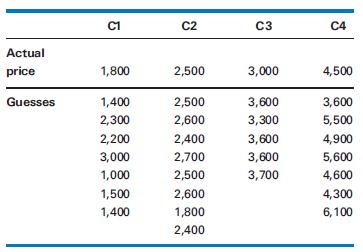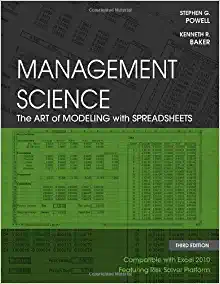A marketing manager for a computer manufacturer was interested in whether consumers could evaluate the price of
Question:
A marketing manager for a computer manufacturer was interested in whether consumers could evaluate the price of laptops and desktops with different features. An Weeks experiment was devised in which a set of consumers were randomly shown one computer from an inventory and were asked to guess its price. Four computers were used in the study, with list prices of $1,800; $2,500; $3,000; and $4,500. The following table summarizes the findings. Each column represents a different computer, with its price in the first row. The rest of the column contains the various guesses by randomly selected customers.

a. Explore the possibility of a linear relation between a customer’s guesses and actual prices. Does there seem to be a strong linear relationship, based on a scatter plot and the correlation?
b. Build a linear model to represent a customer’s price guess for a given computer price. What guess would the model predict for a computer that has a list price of $3,600?
c. What is the probability that the intercept term in the model of (a) is actually zero? Build a linear model with an intercept of zero to represent a customer’s price guess for a given computer price. What guess would the model predict for a computer that has a list price of $3,600?
d. What advantages or disadvantages does the model in (b) have?
Step by Step Answer:

Management Science The Art Of Modeling With Spreadsheets
ISBN: 9780470530672
3rd Edition
Authors: Stephen G. Powell, Kenneth R. Baker





